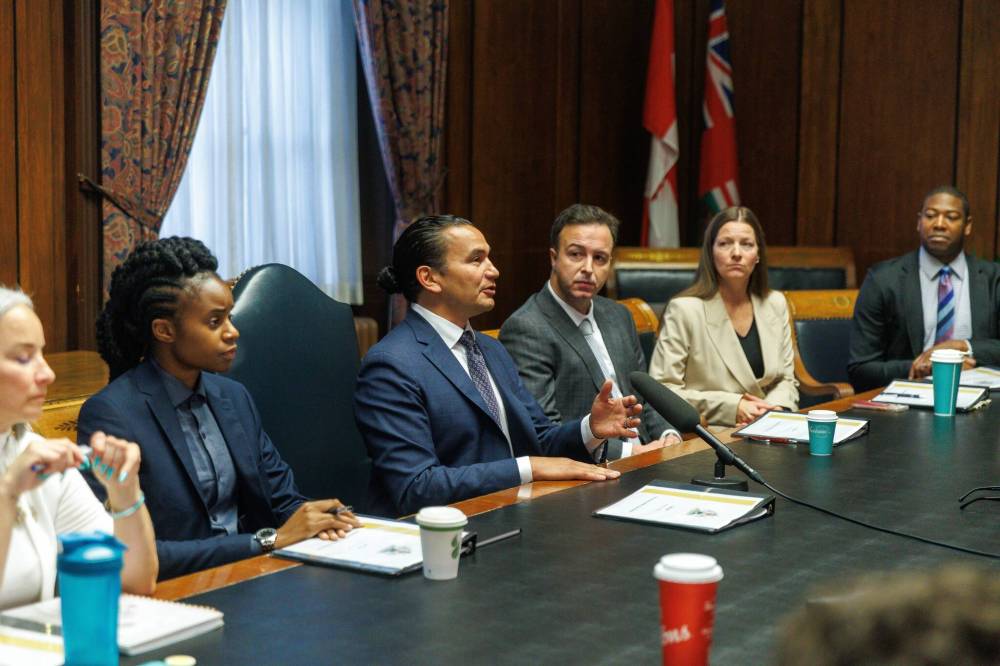Remarkable recognition a massive step towards reconciliation
Advertisement
Read this article for free:
or
Already have an account? Log in here »
To continue reading, please subscribe:
Monthly Digital Subscription
$1 per week for 24 weeks*
- Enjoy unlimited reading on winnipegfreepress.com
- Read the E-Edition, our digital replica newspaper
- Access News Break, our award-winning app
- Play interactive puzzles
*Billed as $4.00 plus GST every four weeks. After 24 weeks, price increases to the regular rate of $19.95 plus GST every four weeks. Offer available to new and qualified returning subscribers only. Cancel any time.
Monthly Digital Subscription
$4.99/week*
- Enjoy unlimited reading on winnipegfreepress.com
- Read the E-Edition, our digital replica newspaper
- Access News Break, our award-winning app
- Play interactive puzzles
*Billed as $19.95 plus GST every four weeks. Cancel any time.
To continue reading, please subscribe:
Add Free Press access to your Brandon Sun subscription for only an additional
$1 for the first 4 weeks*
*Your next subscription payment will increase by $1.00 and you will be charged $16.99 plus GST for four weeks. After four weeks, your payment will increase to $23.99 plus GST every four weeks.
Read unlimited articles for free today:
or
Already have an account? Log in here »
Hey there, time traveller!
This article was published 19/10/2023 (831 days ago), so information in it may no longer be current.
At the end of his first speech as Manitoba’s premier, Wab Kinew announced that he was appointing himself as minister for Indigenous reconciliation.
“There is a structural change we are bringing into Manitoba’s government today,” he declared.
“The message that I am sending is simple, and it is to the leaders of Indigenous governments across Manitoba. Our government will recognize you for what you are — the leaders of governments — governments just like the other orders of government across Manitoba, Canada and all across North America.”

MIKE DEAL / WINNIPEG FREE PRESS
Premier Wab Kinew is again breaking new ground, becoming the first provincial premier to also hold the Indigenous relations file.
Coming at the end of a historic, celebratory two-hours-long cabinet swearing-in ceremony, many people in the media missed this.
It was, however, the most remarkable moment in a day of remarkable moments.
In one statement, Kinew essentially rewrote Canada’s Constitution, rejected a century-and-a-half of provincial-Indigenous relations and added another first to his resumé by being the first provincial premier in history to also take on the role of Indigenous affairs minister.
To be clear, he not the first Canadian leader to carry both portfolios.
Territorial premiers have also acted as de facto ministers of Indigenous relations, and a few Canadian prime ministers have also performed both roles simultaneously (Sir John A. Macdonald and Sir Wilfrid Laurier, most notably).
Never, however, has a provincial premier taken on that responsibility.
And that is, simply, because the provinces never have to take the lead in relationships with Indigenous governments.
Under section 91 of the Constitution, the federal government carries jurisdiction over “Indians and lands reserved for Indians” via governmental bodies (such as the “chief and council” system) established under the Indian Act.
While provincial governments carry responsibilities that force them to interact with First Nations, Inuit and Métis communities (justice, health and natural resources, as examples), provinces generally follow the federal lead when it comes to relating with Indigenous governments.
Provincial representatives may sit at negotiation tables with First Nations governments, but the federal government has the ultimate say on decisions made.
This is worse for Métis governments, who are disregarded all the time. Former premier Brian Pallister tossed aside self-government agreements Manitoba had negotiated with the Manitoba Métis Federation as though they meant nothing.
Indigenous governments are a fourth-ish, and somewhat powerless, layer of government in Canada.
I say “powerless” because decisions Indigenous governments make are regularly ignored by federal, provincial and municipal authorities.
Simply put: if police officers, nurses, doctors and conservation officers won’t enforce a government’s decisions, that government has little, if any, power at all.
Not anymore in Manitoba, apparently.
In one statement, Kinew not only recognized Indigenous governments as co-governing partners with his government but their ability to make decisions, pass laws and have them enforced at the same time.
No wonder Kinew also appointed himself minister of Indigenous reconciliation.
His job is brain-numbing in its complexity.
He will now try to convince bodies such as the RCMP and Winnipeg Police Service, hospitals and nursing stations, and every single other public entity in the province — all used to ignoring Indigenous government decisions — that they must respect and enforce laws passed by Manitoba’s 63 First Nations and the MMF.
Talk about reconciliation.
Kinew’s statement makes British Columbia’s 2019 commitment to bring its laws into concert with the United Nations Declaration on the Rights of Indigenous Peoples look easy.
B.C. has committed to an action plan to recognize the declaration’s 46 articles — all of which state that Indigenous peoples have the right to self-govern and have Indigenous laws and rights recognized and affirmed – within five years.
Kinew did it in about 15 seconds.
I’m being facetious, of course. It will take years for Manitobans across the province to accept the basic premise that Indigenous governments can co-govern alongside municipal, provincial and federal governments.
I’d be lying if I said I wasn’t interested in what Kinew’s government will do when the decision of a First Nations or Métis government conflicts with Manitoba’s laws.
It may happen sooner, rather than later.
If Kinew’s promise to fix health care — the main thrust of the NDP’s election campaign — is going to be fulfilled, he will need to make some radical steps to build Manitoba’s economy.
In the past, much economic development has come from resource development — commodifying the water, metals and minerals claimed by First Nations and Métis governments.
When Indigenous governments have protested Manitoba’s development ideas, the provincial government performed some ornamental “consultation” and proceeded anyway.
Pallister, in fact, tried to introduce a law to ban protest, rather than treat Indigenous governments as partners.
The premier and the minister of Indigenous reconciliation are the same person now, signalling a new — and radical — partnership may also be beginning.
niigaan.sinclair@freepress.mb.ca

Niigaan Sinclair is Anishinaabe and is a columnist at the Winnipeg Free Press.
Our newsroom depends on a growing audience of readers to power our journalism. If you are not a paid reader, please consider becoming a subscriber.
Our newsroom depends on its audience of readers to power our journalism. Thank you for your support.
History
Updated on Friday, October 20, 2023 6:30 AM CDT: Minor copy editing changes




